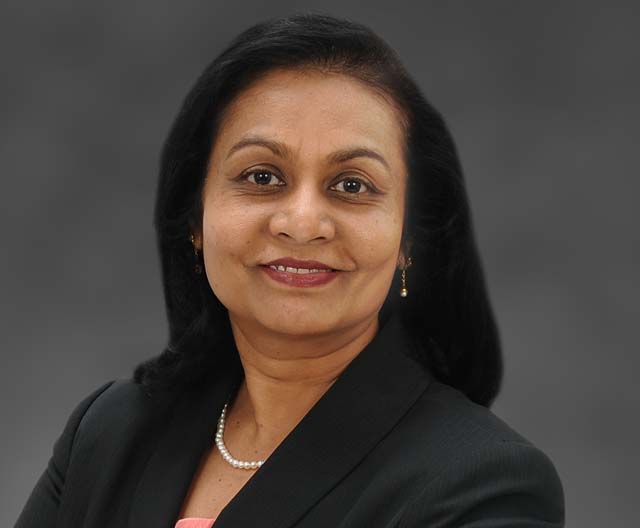-
News
April 14, 2023
Dr. Judy Jeevarajan Appointed Chair of International Electrotechnical Commission (IEC) Subcommittee 21A

Dr. Judy Jeevarajan, vice president and executive director of UL Research Institutes’ Electrochemical Safety Research Institute (ESRI), has been appointed as chair of the International Electrotechnical Commission (IEC) Technical Committee 21’s Subcommittee (SC) 21A. The subcommittee on Secondary cells and batteries containing alkaline or other non-acid electrolytes prepares product and test specification standards for all sealed and vented rechargeable (secondary) cells and batteries containing alkaline or other non-acid electrolytes.
Dr. Jeevarajan’s role as chair of IEC’s SC 21A will support the mission of UL Research Institutes to build a safer world and will open several opportunities to disseminate our scientific research experiences on energy storage technology for the development of public safety standards.
“It is a proud moment for UL Research Institutes,” said Dr. Chris Cramer, senior vice president and chief research officer of UL Research Institutes. “We embrace transparency, and we aim to cultivate a collaborative learning environment where knowledge, innovative ideas, valuable insights, and best practices are exchanged to inform the efforts of all who work to ensure the ongoing well-being and prosperity of our planet. Judy’s role as chair of IEC subcommittee 21A will help translate our safety science research into actionable safety standards and contribute towards a safer, more secure, and sustainable world.”
Energy storage has become increasingly crucial in recent years as the world transitions to a more renewable energy-based economy. The BloombergNEF forecasts the global energy storage market to grow 15-fold by 2030. A combination of factors is driving this growth, including declining costs for energy storage technologies, increasing demand for renewable energy, and the need for greater energy resilience and reliability due to extreme climate change and weather conditions. In addition, government policies and incentives aimed at promoting the deployment of energy storage are also helping to drive growth in the sector. Such interventions will help close the demand and supply gap and support the transition to a more sustainable and resilient energy ecosystem globally.
Secondary cells and batteries play a critical role in energy storage, and diverse types of batteries are used in a range of applications depending on factors such as energy or power density, cycle life, cost, and other performance characteristics. Common examples of secondary cells and batteries include nickel-metal hydride (NiMH) batteries, nickel-cadmium (NiCd) batteries, and lithium-ion (Li-ion) batteries, all containing alkaline or other non-acid electrolytes. Different battery chemistries, due to the energy factor and chemical components associated with them, have various performance characteristics as well as safety characteristics.
The IEC has traditionally set up committees and subcommittees to establish performance and safety standards for all sealed and vented secondary cells and batteries containing alkaline or other non-acid electrolytes. Standards established verify the performance and safety of these batteries in the relevant applications, which can vary from single cells and portable devices all the way to exceptionally large battery energy storage systems. The standards provide recommendations on when a manufacturer of cells and batteries should retest.
The SC 21A has seven working groups with each focusing on a different chemistry or application, from secondary alkaline and lithium cells and batteries for portable and industrial applications to aircraft batteries and environmental issues related to secondary cells and batteries containing alkaline or other non-acid electrolytes.
As chair of SC 21A, Dr. Jeevarajan will oversee the management of the subcommittee, including its working groups and project teams. She will take the lead in the overall standards development process and related committee projects. The six-year appointment was effective April 1 and runs through March 31, 2029.
Prior to this appointment, Dr. Jeevarajan served as the technical advisor for the U.S. National Committee to the SC 21A for the past three years, collaborating with the various working groups and providing unbiased feedback based on the scientific research studies conducted at UL Research Institutes. During that time, as project lead for IEC 62133-2, she also introduced new proposals in the lithium-ion standards.
“In this new role as subcommittee chair, I look forward to partnering with the Secretary of SC 21A and convenors of the various working groups to put forward new standards for the ever-evolving energy storage applications, as well as updating existing standards as the committee members bring new data and learnings,” Dr. Jeevarajan said. “I also look forward to sharing our scientific research data with the relevant working groups as we advance our studies, which are in line with our mission of making the world a safer place.”
Learn more about the IEC SC 21A here: IEC - SC 21A Dashboard> Scope
About International Electrotechnical Commission (IEC)
The IEC is a global, not-for-profit membership organization, whose work underpins quality infrastructure and international trade in electrical and electronic goods. Its work facilitates technical innovation, affordable infrastructure development, efficient and sustainable energy access, smart urbanization and transportation systems, climate change mitigation, and increases the safety of people and the environment. IEC develops and publishes safety standards for electrical, electronic, and related technologies. Its standards are regularly updated to reflect changes in technology and to address new safety concerns. Compliance with IEC safety standards are often required by law, particularly in countries that have adopted these standards as part of their national regulations.